July 2022 in “DOAJ (DOAJ: Directory of Open Access Journals)” Androgenetic alopecia is common, affects self-image, and has no complete cure yet.
June 2022 in “European Psychiatry” Eating disorders in gender dysphoria patients may be a coping mechanism for body image issues.
[object Object]  44 citations,
December 2010 in “Journal of Investigative Dermatology”
44 citations,
December 2010 in “Journal of Investigative Dermatology” Alopecia areata seriously lowers quality of life, especially affecting self-image, mental health, and social life.
22 citations,
December 2011 in “British journal of dermatology/British journal of dermatology, Supplement” Over 40% of women have unwanted facial hair, which can affect their self-image, and should be managed with personalized treatment and support.
 16 citations,
November 2015 in “International Journal of Dermatology”
16 citations,
November 2015 in “International Journal of Dermatology” Alopecia greatly lowers the quality of life for South African Black women, especially affecting their self-image and social interactions.
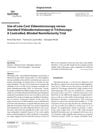 10 citations,
January 2015 in “Skin appendage disorders”
10 citations,
January 2015 in “Skin appendage disorders” Low-cost videomicroscopes are not as reliable as standard videodermatoscopes for scalp examination due to lower image quality.
 1 citations,
March 2015 in “Journal of Visualized Experiments”
1 citations,
March 2015 in “Journal of Visualized Experiments” Researchers developed a new, precise method to measure hair loss in mice using image analysis.
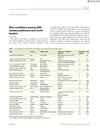 2 citations,
July 2021 in “Journal of The European Academy of Dermatology and Venereology”
2 citations,
July 2021 in “Journal of The European Academy of Dermatology and Venereology” Many 20th century politicians had skin conditions, with vitiligo being most common, affecting their image and political life.
 April 2024 in “Journal of burn care & research”
April 2024 in “Journal of burn care & research” Surgery for burn scar alopecia often involves multiple procedures, and treatment options should be more accessible to improve self-image.
 October 2023 in “The Open public health journal”
October 2023 in “The Open public health journal” Alopecia greatly affects Greek women's daily life, relationships, and self-image, with mixed social support and dissatisfaction with treatments.
 January 2023 in “Brazilian Journals Editora eBooks”
January 2023 in “Brazilian Journals Editora eBooks” The document concludes that Passiflora incarnata could help with anxiety, telemedicine might improve heart failure care, screen time for kids has increased, pregnant teens in Brazil are mostly okay with their body image, rare tuberculosis infection can occur after knee surgery, older and severely ill people are more likely to have long COVID-19 symptoms, HPLC might diagnose more diabetes cases, and psychiatrists should be involved in pain management.
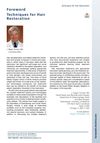 April 2020 in “Facial Plastic Surgery Clinics of North America”
April 2020 in “Facial Plastic Surgery Clinics of North America” In 2020, many new hair restoration treatments were developed, improving self-image and social interaction, with experts suggesting personalized treatment plans based on individual needs.
 June 2000 in “British Journal of Clinical Psychology”
June 2000 in “British Journal of Clinical Psychology” The reviews critique three psychology books, noting skepticism about a personality inventory for teens, praising a practical guide on body image issues, and recommending a book on grief therapy.
 January 2023 in “Brazilian Journals Editora eBooks”
January 2023 in “Brazilian Journals Editora eBooks” The document concludes that Passiflora incarnata may help with anxiety, healthcare workers need mental support, common bacteria cause hospital UTIs, telehealth for heart failure needs research, kids' screen time has increased, pregnant teens are mostly okay with their body image, diagnosing post-surgery tuberculosis is hard, older and severely ill people are more likely to have long COVID symptoms, and psychiatrists should be part of pain management teams.
 January 2023 in “Brazilian Journals Editora eBooks”
January 2023 in “Brazilian Journals Editora eBooks” Passiflora incarnata may help with anxiety but has risks and drug interactions.
There's a genetic link between Fragile X Syndrome and Autism Spectrum Disorder.
6.7% of urine cultures showed hospital-acquired urinary tract infections.
Children used screens more during COVID-19, causing various health complaints.
Autism Spectrum Disorder is often underdiagnosed in females.
Dissociative disorders in childhood sexual abuse victims are more common in males.
Most pregnant teenagers are not dissatisfied with their body image but worry about weight.
Diagnosing tuberculosis after knee surgery is challenging due to non-specific symptoms.
Post-COVID-19 syndrome is more common in older, severely affected patients.
Psychiatrists should be part of pain management teams due to the psychological aspects of pain.
 56 citations,
September 2013 in “Experimental Dermatology”
56 citations,
September 2013 in “Experimental Dermatology” The guide explains how to study human and mouse sebaceous glands using various staining and imaging techniques, and emphasizes the need for standardized assessment methods.
[object Object] 11 citations,
April 2016 in “PubMed” New imaging and testing methods can effectively assess hair shape changes and damage.
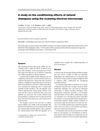 10 citations,
June 2001 in “International Journal of Cosmetic Science”
10 citations,
June 2001 in “International Journal of Cosmetic Science” Natural shampoos made in the lab conditioned hair better than commercial ones with chemicals.
 October 2023 in “Sinkron”
October 2023 in “Sinkron” The system can accurately classify hair diseases with 94.5% accuracy using a CNN.
April 2019 in “The journal of investigative dermatology/Journal of investigative dermatology” Higher resolution images are needed to identify scarring and fine hair in alopecia.
 222 citations,
October 1993 in “Journal of The American Academy of Dermatology”
222 citations,
October 1993 in “Journal of The American Academy of Dermatology” Hair loss affects women's mental health more than men's, causing anxiety, low self-esteem, and social insecurity.
 192 citations,
June 1992 in “Journal of The American Academy of Dermatology”
192 citations,
June 1992 in “Journal of The American Academy of Dermatology” Hair loss can cause low self-esteem, anxiety, and depression in men.
 180 citations,
September 1999 in “British Journal of Dermatology”
180 citations,
September 1999 in “British Journal of Dermatology” Hair loss affects self-esteem and quality of life; treatments can help.
 87 citations,
December 2004 in “Dermatology”
87 citations,
December 2004 in “Dermatology” Different types of skin pores should be identified correctly and evaluated with suitable methods for reliable results.
 70 citations,
June 2003 in “Journal of Investigative Dermatology Symposium Proceedings”
70 citations,
June 2003 in “Journal of Investigative Dermatology Symposium Proceedings” TrichoScan is a reliable method for measuring hair growth and is useful for assessing hair loss treatments.
40 citations,
October 2012 in “Journal of the American Academy of Dermatology” CLASI is a valid tool for assessing skin activity and damage in lupus patients.
 33 citations,
January 2005 in “Dermatology”
33 citations,
January 2005 in “Dermatology” Trichoscan is a reliable method for measuring hair growth and monitoring treatment effectiveness in hair loss.
 19 citations,
July 2020 in “Journal of cancer survivorship”
19 citations,
July 2020 in “Journal of cancer survivorship” People undergoing chemotherapy need better support and information to cope with hair loss.
 8 citations,
March 2019 in “Progress in Human Geography”
8 citations,
March 2019 in “Progress in Human Geography” Hair significantly shapes body identity and social interactions, influencing how we perceive and relate to our bodies.
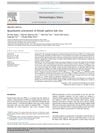 5 citations,
February 2015 in “Dermatologica Sinica”
5 citations,
February 2015 in “Dermatologica Sinica” Computer-aided imaging system helps measure balding area in female pattern hair loss.























